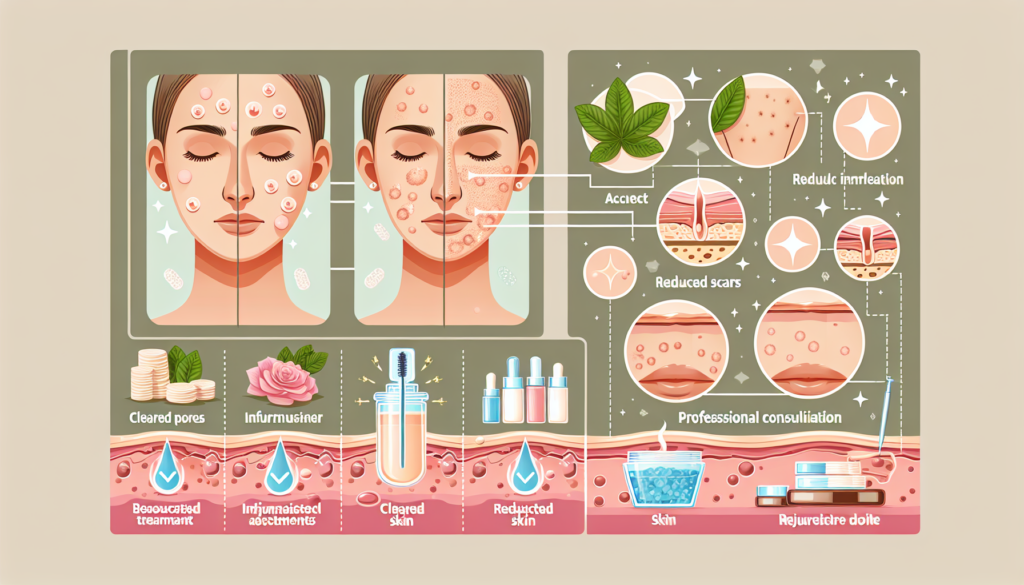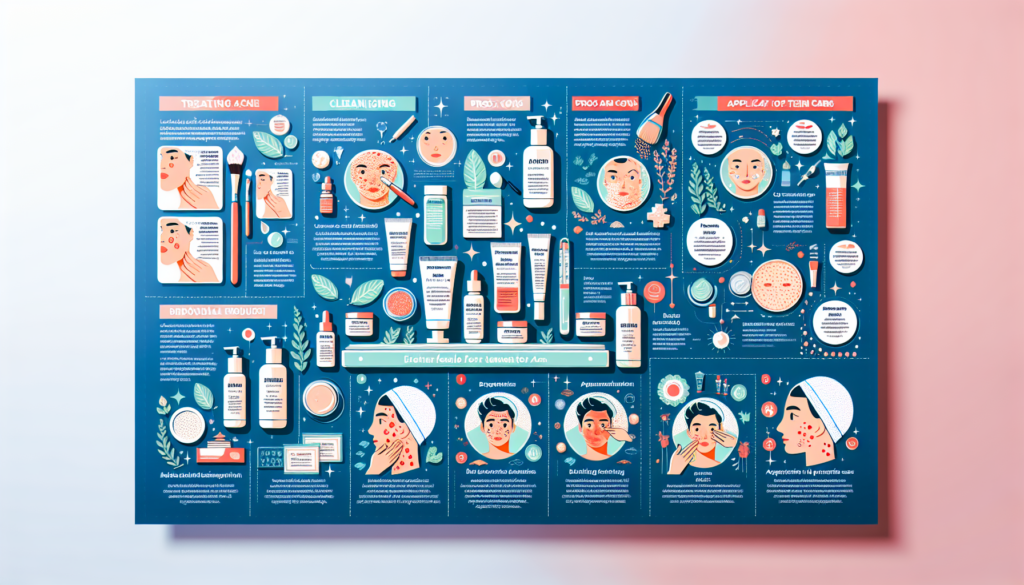If you’re troubled by acne and acne scars, you may be wondering if facials hold the key to clearer skin. Well, wonder no more! In this article, we’ll explore the effectiveness of facials in combating acne and reducing the appearance of acne scars. With a focus on your skin’s health and rejuvenation, we’ll dive into the various types of facials and their potential benefits. So, get ready to uncover the secrets behind facials and discover if they are truly the skincare solution you’ve been seeking. Say goodbye to blemishes and hello to a radiant complexion with our expert insights.

What are facials?
Facials are a popular skincare treatment that involves a series of steps to cleanse, exfoliate, and nourish the skin. They typically include a combination of steam, masks, massage, and various skincare products. Facials are known for their ability to rejuvenate and refresh the skin, leaving it smoother, softer, and more radiant.
Definition and purpose of facials
Facials, in the context of skincare, refer to professional treatments performed by licensed estheticians or dermatologists. These treatments are designed to address specific skin concerns, including acne and acne scars. The main purpose of facials is to improve the overall health and appearance of the skin by providing deep cleansing, hydration, and targeted treatments.
Causes of acne and acne scars
Acne is a common skin condition that occurs when hair follicles become clogged with oil, dead skin cells, and bacteria. This can result in the formation of pimples, blackheads, and whiteheads. Acne breakouts can be caused by hormonal changes, excess oil production, certain medications, and other factors.
Understanding the root causes of acne breakouts
Acne breakouts are often influenced by hormonal changes during puberty, menstrual cycles, and pregnancy. Increased androgen activity stimulates the production of oil in the skin, which can contribute to clogged pores and inflammation. Other factors, such as stress, diet, and medication, can also affect the development of acne.
The formation and types of acne scars
When acne lesions are severe or persistently inflamed, they can lead to scarring. Acne scars form as a result of tissue damage and the body’s attempt to heal itself. There are different types of acne scars, including atrophic scars that appear as depressions in the skin and hypertrophic scars that are raised and thickened.
Benefits of facials for acne
Facials can provide numerous benefits for individuals struggling with acne. Here are some ways in which facials can help in the treatment of acne:
Reduction of acne-causing bacteria
Facials often involve the use of antibacterial products and techniques that target acne-causing bacteria. This can help to minimize the presence of harmful bacteria on the skin and reduce the likelihood of future breakouts.
Extraction of blackheads and whiteheads
One of the key steps in a facial is the extraction of blackheads and whiteheads. Estheticians use specialized tools and techniques to gently remove these impurities, which can help to unclog pores and prevent the formation of new acne lesions.
Cleansing and unclogging of pores
Facials typically include deep cleansing of the skin, which helps to remove excess oil, dirt, and dead skin cells that can contribute to acne. By thoroughly unclogging the pores, facials can help to prevent future breakouts and promote a clearer complexion.
Soothing inflammation and redness
Many facials incorporate soothing and anti-inflammatory ingredients and techniques. This can help to calm irritated skin, reduce redness, and alleviate the discomfort associated with acne breakouts. By addressing inflammation, facials can contribute to the overall healing process of the skin.
Promoting a healthy skin barrier
Facials often involve the application of moisturizing and nourishing products that hydrate the skin and support its natural protective barrier. By improving the health and integrity of the skin barrier, facials can create an environment that is less prone to acne breakouts.

Specific facial treatments for acne
When it comes to treating acne, there are various facial treatments available. These treatments target specific aspects of acne-prone skin and can be customized to suit individual needs. Some common facial treatments for acne include:
Chemical peels
Chemical peels involve the application of a solution to the skin, which causes it to exfoliate and eventually peel off. This process helps to unclog pores, remove dead skin cells, and promote the growth of new, healthier skin. Chemical peels can be beneficial in reducing acne and acne scars.
Microdermabrasion
Microdermabrasion is a non-invasive treatment that uses tiny exfoliating crystals to remove the outermost layer of the skin. This process helps to improve skin texture, unclog pores, and reduce the appearance of acne scars. Microdermabrasion is particularly effective for individuals with mild to moderate acne.
High-frequency treatments
High-frequency treatments involve the use of a high-frequency device that emits a mild electrical current. This current helps to kill acne-causing bacteria, reduce inflammation, and promote the healing of acne lesions. High-frequency treatments can be an effective addition to facials for acne-prone skin.
LED therapy
LED (Light Emitting Diode) therapy utilizes different wavelengths of light to target specific skin concerns. For acne, blue light is often used as it has antibacterial properties and can help to reduce the activity of oil glands. LED therapy can be an effective standalone treatment or a complement to other facial procedures.
Acne-fighting ingredient facials
Facials that specifically target acne often incorporate products containing active ingredients like salicylic acid, benzoyl peroxide, or tea tree oil. These ingredients are known for their ability to control oil production, unclog pores, and kill bacteria, making them valuable in the treatment of acne.
Effectiveness of facials for acne and acne scars
The effectiveness of facials for acne and acne scars has been supported by scientific research and countless positive experiences from individuals who have undergone these treatments.
Scientific research and evidence
Several studies have demonstrated the efficacy of facials in reducing acne lesions, controlling oil production, and improving overall skin condition. These studies have shown that specific treatments, such as chemical peels and microdermabrasion, can lead to significant improvements in acne severity and scar appearance.
Real-life testimonials and experiences
Many individuals have reported noticeable improvements in their acne and acne scars after receiving regular facials. They often highlight reduced breakouts, smoother skin texture, and a more even complexion as some of the benefits they have experienced. Real-life testimonials provide anecdotal evidence of the positive impact that facials can have on acne-prone skin.
How often should you get facials for acne?
The frequency of facials for acne depends on individual needs and skin type. Skincare professionals can provide personalized recommendations based on the severity of acne, the desired treatment outcomes, and the individual’s tolerance to specific treatments.
Recommendations by skincare professionals
In general, skincare professionals suggest scheduling facials for acne every 4-6 weeks. This timeframe allows for the skin to fully recover and for the benefits of the treatment to take effect. However, individuals with severe acne or specific skin concerns may require more frequent sessions.
Considerations for different skin types
Different skin types may require variations in the frequency of facials. For example, individuals with oily skin and frequent breakouts may benefit from more frequent treatments, while those with sensitive or dry skin should be cautious not to overstimulate or irritate their skin. It is crucial to consult with a skincare professional who can assess individual needs and recommend an appropriate treatment schedule.
Risks and considerations
While facials for acne are generally safe and well-tolerated, there are some risks and considerations to be aware of, particularly for individuals with sensitive skin or specific medical conditions.
Possible side effects of facials
Facials can occasionally cause temporary side effects such as redness, irritation, or mild breakouts. These side effects are typically mild and subside within a few days. However, individuals with sensitive skin should communicate their concerns to the esthetician beforehand to ensure a tailored treatment that minimizes the risk of adverse reactions.
Precautions for sensitive skin or specific medical conditions
Individuals with sensitive skin or certain medical conditions, such as rosacea, eczema, or active skin infections, should exercise caution when considering facials for acne. It is important to inform the skincare professional about any existing skin conditions or allergies to avoid potential complications.
Combining facials with other acne treatments
Facials can be a valuable addition to other acne treatments to enhance their efficacy and overall results. Here are some options to consider:
Oral and topical medications
Facials can complement the use of oral medications, such as antibiotics or hormonal treatments, as well as topical treatments like retinoids or benzoyl peroxide. The combined approach can provide a more comprehensive and targeted solution for acne.
Professional acne treatments
In severe cases, professional acne treatments like laser therapy or corticosteroid injections may be recommended. These treatments can be combined with facials to optimize results and address specific concerns, such as acne scars or deep-rooted acne lesions.
At-home skincare routines
Maintaining an effective at-home skincare routine is essential to prolong the benefits of facials and support ongoing acne treatment. Skincare professionals can provide guidance on suitable products and techniques to use between facial sessions for optimal results.
Professional advice and consultation
To make the most informed decisions about facials for acne, it is advisable to seek guidance from a dermatologist or licensed esthetician. These professionals can evaluate the individual’s skin condition, identify the most suitable treatments, and create a customized plan tailored to their needs.
Seeking guidance from a dermatologist or esthetician
Dermatologists and estheticians are skincare experts who have the knowledge and experience to assess and address specific skin concerns. They can provide a comprehensive analysis of the individual’s skin, recommend appropriate treatments, and monitor progress throughout the course of treatment.
Customized treatment plans
A customized treatment plan is crucial for achieving optimal results with facials for acne. Skincare professionals will consider factors such as skin type, severity of acne, and treatment goals when designing a treatment plan. This personalized approach ensures that the individual receives the most effective and suitable treatments for their unique needs.
Conclusion
Facials can be a beneficial and effective treatment option for individuals struggling with acne and acne scars. By addressing the root causes of acne, reducing inflammation, and promoting a healthy skin barrier, facials can contribute to clearer, healthier skin. Combined with other acne treatments and personalized advice from skincare professionals, facials can provide comprehensive support in the journey to achieve a more radiant and acne-free complexion.

